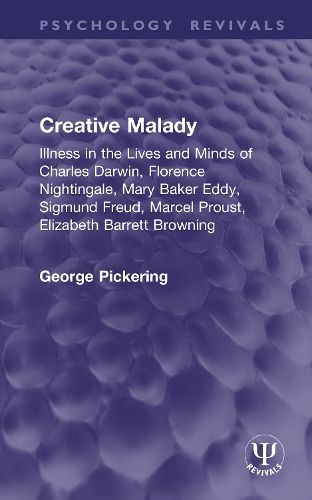Readings Newsletter
Become a Readings Member to make your shopping experience even easier.
Sign in or sign up for free!
You’re not far away from qualifying for FREE standard shipping within Australia
You’ve qualified for FREE standard shipping within Australia
The cart is loading…






In this highly provocative book, originally published in 1974, Sir George Pickering, former Professor of Medicine in the University of London and Regius Professor in the University of Oxford, examines the role of illness in the minds and lives of Charles Darwin, Florence Nightingale, Freud, Proust, Elizabeth Barrett Browning and Mary Baker Eddy.
At the age of twenty-six Darwin returned from the voyage of the Beagle a vigorous young naturalist. Within two years he became a recluse and so remained until he died. Florence Nightingale came back from the Crimea at the age of thirty-six a national heroine. Within a year she was an invalid, within two bedridden. Yet she lived to ninety. Both used illness as a social 'weapon': Darwin, so that he could give his undivided attention to the theory of evolution; Florence Nightingale to bludgeon reluctant officials and to keep unwanted relatives at bay.
With Mary Baker Eddy, Freud, and Proust psychological illness played a totally different role. Christian Science, psychoanalysis and A la recherche du temps perdu each owed its very existence to its creator's attempted or successful self-cure - while with Elizabeth Barrett Browning, who at first sight seems a similar psychological creator, illness and creativity turn out to have no link.
Creative Malady is a masterpiece of biographical detective work. For the first time the relationship between illness and creativity was explored. Each of the eminent Victorians described was possessed by a dominating passion and in each case the author shows what happened when that passion was thwarted or fulfilled. Today it can be read in its historical context.
This book is a re-issue originally published in 1974. The language used and views portrayed are a reflection of its era and no offence is meant by the Publishers to any reader by this re-publication.
$9.00 standard shipping within Australia
FREE standard shipping within Australia for orders over $100.00
Express & International shipping calculated at checkout
In this highly provocative book, originally published in 1974, Sir George Pickering, former Professor of Medicine in the University of London and Regius Professor in the University of Oxford, examines the role of illness in the minds and lives of Charles Darwin, Florence Nightingale, Freud, Proust, Elizabeth Barrett Browning and Mary Baker Eddy.
At the age of twenty-six Darwin returned from the voyage of the Beagle a vigorous young naturalist. Within two years he became a recluse and so remained until he died. Florence Nightingale came back from the Crimea at the age of thirty-six a national heroine. Within a year she was an invalid, within two bedridden. Yet she lived to ninety. Both used illness as a social 'weapon': Darwin, so that he could give his undivided attention to the theory of evolution; Florence Nightingale to bludgeon reluctant officials and to keep unwanted relatives at bay.
With Mary Baker Eddy, Freud, and Proust psychological illness played a totally different role. Christian Science, psychoanalysis and A la recherche du temps perdu each owed its very existence to its creator's attempted or successful self-cure - while with Elizabeth Barrett Browning, who at first sight seems a similar psychological creator, illness and creativity turn out to have no link.
Creative Malady is a masterpiece of biographical detective work. For the first time the relationship between illness and creativity was explored. Each of the eminent Victorians described was possessed by a dominating passion and in each case the author shows what happened when that passion was thwarted or fulfilled. Today it can be read in its historical context.
This book is a re-issue originally published in 1974. The language used and views portrayed are a reflection of its era and no offence is meant by the Publishers to any reader by this re-publication.